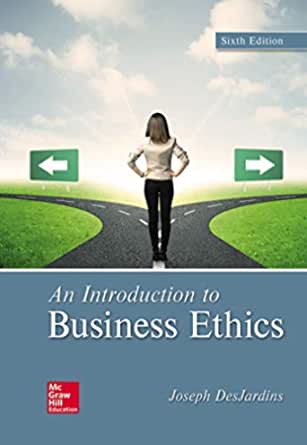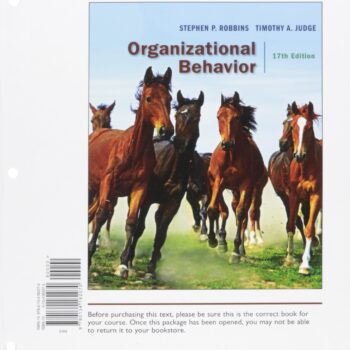
Test Bank For An Introduction To Business Ethics 6Th Edition By Joseph DesJardins
Original price was: $55.00.$24.00Current price is: $24.00.
Digital item No Waiting Time Instant DownloadISBN-13: 978-1259922664 ISBN-10: 1259922669
Hello! Welcome to the fascinating world of business ethics. I can tell you that ethics is hard to study. It isn’t easy to understand the business models and concepts but luckily you can always use The Test Bank For An Introduction To Business Ethics, 6th Edition By Joseph DesJardins.
What You Should Expect From the Test Bank?
The test bank answers all the crucial aspects of business ethics including three topics namely: textbook complementary, review, and application. Here are some of the topics you will find quite interesting:
- Ethical Theory and Business: Examine best practices for making ethical decisions in business.
- Corporate Social Responsibility: Responsibilities of business toward society and vice versa.
- Corporate Culture: Analyze the relationship between the culture within the company and the ethics of employees.
- Workplace Diversity: Different races and workplace ethics and their influence on each other.
Why Use This Test Bank?
There are a number of positive aspects that can be derived from each chapter of The Test Bank For An Introduction To Business Ethics, 6th Edition including the following.
- Better Understanding: Examining each context in detail deepens the understanding of ethical issues in any aspect of business activity.
- Exam Preparation: Assists you in your readiness for the test by giving you sample questions that resemble the questions you might get.
- Convenience: A chance to learn at your own pace on any topic, anytime, and from anywhere.
How to Optimize Test Bank
To learn effectively from this test bank, try to consider the following strategies:
- Set Reminders: Schedule time for learning every topic at regular intervals.
- Get Together And Discuss: Talk about the questions with your colleague to get a diverse view on the question.
- Analyze The Correct Responses: After providing answers to the questions, give a thought as to why the correct answer was the correct one. This would help you reinforce your mind.
Conclusion
The Test Bank for An Introduction to Business Ethics, 6th Edition by Joseph DesJardins is a study aid worth having for anyone interested in understanding and mastering concepts related to business ethics. It makes sure that your learning becomes smooth, which otherwise is difficult to understand. Students who use this test bank will be able to enhance their knowledge and competence in business ethics, thus preparing them to approach exams confidently.
Test Bank For An Introduction To Business Ethics 6Th Edition By Joseph DesJardins
An Introduction to Business Ethics, 6e (DesJardins) Chapter 2 Ethical Theory and Business
1) Which of the following statements is true of ethical theories?
A) Most ethical theories place utmost importance tonmatters of personal opinion, individual desires, preferences, and wants.
B) Ethical theories are very abstract and disconnected from the realities of everyday life.
C) Ethical theories not only guide our actions but also provide reasonable justification for prescribing behavior.
D) Most ethical theories hold that good and bad acts should be judged by their consequences.
Answer: C
Accessibility: Keyboard Navigation
2) Which of the following ethical traditions implies that a greedy person who does distasteful and selfish things will not lead a fulfilling and good human life?
A) Virtue ethics
B) Utilitarianism
C) Kantian categorical imperative
D) Psychological egoism
Answer: A
Accessibility: Keyboard Navigation
3) Which of the following statements is true of utilitarian ethics?
A) It upholds adhering to a set of principles that may forbid an act that might otherwise provide overall good consequences.
B) It holds that the ethical significance of any action can be determined by looking at the consequences of that act.
C) It applies most appropriately to ethical personal behavior and decision-making
D) It believes in maximizing personal well-being and the achievement of hedonistic pleasures.
Answer: B
Accessibility: Keyboard Navigation
4) Which statement is a legitimate challenge to utilitarian ethical theory?
A) The ends do not justify the means.
B) There is no consensus among utilitarians on how to measure and determine the overall good.
C) It is difficult to know how to consider the consequences for all the parties that will be affected by an act.
D) It is difficult for the utilitarian to find a balance between individual freedom and the overall good. The more utilitarians emphasize freedom, the more likely they hold more relativistic accounts of the good.
E) All of the answers are correct.
F) None of the answers are correct.
Answer: E
Accessibility: Keyboard Navigation
5) Which of the following reasons accounts for utilitarianism’s dominance among ppolicymakersand administrators?
A) The utilitarian emphasis on measuring, comparing, and quantifying reinforces the view that ppolicymakersshould be neutral administrators.
B) Policy experts at all levels are focused on results and getting things done.
C) Efficiency is simply another word for maximizing happiness.
D) Policy experts focus on the collective or aggregate good.
E) All of the answers are correct.
F) None of the answers are correct.
Answer: E
Accessibility: Keyboard Navigation
6) Which proposition correctly describes the concept of a right?
A) Rights protect a person’s wants.
B) There is no distinction between a person’s wants and interests. Rights protect both.
C) Rights protect a person’s interests.
D) My rights never correspond to your duties and your duties never correspond to my rights.
Answer: C
Accessibility: Keyboard Navigation
7) Which of the following statements is consistent with principle-based ethics?
A) Obligations, responsibilities, and commitments do not determine the correct approach to ethics.
B) Individuals have rights that should not be sacrificed to generate a net increase in the collective good.
C) Although certain acts are wrong, they should be performed for the overall happiness they may produce.
D) An act that produces the greatest beneficial consequences is the ethically right thing to do.
Answer: B
Accessibility: Keyboard Navigation
8) Which of the following statements is true of Kant’s categorical imperative?
A) Kant claimed that all human behavior is egoist, or intended for one’s self-interest.
B) Kant believed that lying could be made a universal law if it benefitted the majority of mankind.
C) Kant believed that child labor can be justified as it is a means for raising the standard of living in an impoverished country.
D) Kant claimed that ethics requires us to treat all people as ends and not only as means.
Answer: D
Accessibility: Keyboard Navigation
9) Which of the following statements is true of virtue ethics?
A) Virtue ethics holds that ethical decisions are determined obythe overall social consequences of an act.
B) Virtue ethics directs us to consider how various character traits can contribute to, or obstruct, a worthy and good human life.
C) Virtue ethics is especially focused on categorizing communities and organizations as good or bad.
D) Virtue ethics is based on the principle that some individuals should not benefit excessively at the expense of vulnerable others.
Answer: B
Accessibility: Keyboard Navigation
10) Principle-based ethics is based on the concepts of promises, justice, fairness, rights, and duties.
Answer: TRUE
Accessibility: Keyboard Navigation
11) Child labor is a very common phenomenon with cases of employing children in the manufacturing of athletic shoes and clothing being the most well-publicized instances.
Answer: TRUE
Accessibility: Keyboard Navigation
12) Because utilitarianism focuses on consequences, producing the greatest happiness for the greatest number as the sole criterion for determining ethical right and wrong, no action is ever right or wrong in itself, in all cases, in every situation—even, perhaps, lying.
Answer: TRUE
Accessibility: Keyboard Navigation
13) Principle-based ethics, also called rights-based ethics, refers to the concept that the correct path to ethical decision-making is determined by duties, such as obligations, commitments, and responsibilities, and not by consequences.
Answer: TRUE
Accessibility: Keyboard Navigation
14) Principle-based ethics might allow the sacrifice of individual rights if the overall good demands it.
Answer: FALSE
Accessibility: Keyboard Navigation
15) According to Kant, any action’s maxim that cannot be universalized is ethically wrong and should not be performed.
Answer: TRUE
Accessibility: Keyboard Navigation






